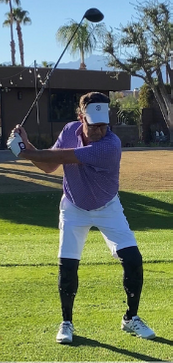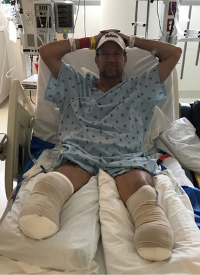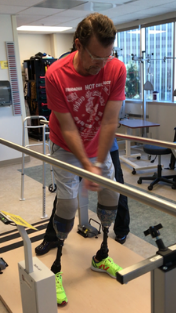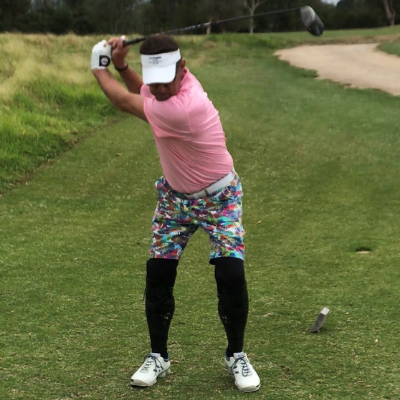 Dedicated to staying physically active and honing his talents, 55-year-old Clint Coleman enjoys working on his golf game, exercising and playing the guitar.
Dedicated to staying physically active and honing his talents, 55-year-old Clint Coleman enjoys working on his golf game, exercising and playing the guitar.
But a little over four years ago, an unexpected and frequently fatal medical condition forced him to take a break from and readjust his way of pursuing those passions.
In October 2016, Clint’s aorta dissected, necessitating a 14-hour surgery at UCLA Health Hospital. Shortly after, he suffered a stroke, which caused paralysis on his right side and some memory loss. Persisting complications from the dissection and the stroke led to circulation issues that caused death of the skin on his feet and right hand.
In and out of hospitals trying to stop and reverse the growing necrosis, his medical team placed Clint on high-oxygen therapy and experimented with other options.
“I had no road map. They gave me a plan to get back my life.”
After months of hopeful treatment, the tough decision was made to amputate both legs below the knee and the fingertips on his right hand.
Four days after the amputations, he was admitted to the California Rehabilitation Institute to begin his journey of regaining independence and retraining his body to complete everyday tasks. Uncertain about his next steps and unsure about what his life was going to look like as an amputee, Clint was confident about the rehabilitative care he would receive there.
“I had no road map. They gave me a plan to get back my life,” he said.
 Starting work on that plan only 48 hours after being admitted, his dedicated care team placed him in strength-building therapy to help him complete basic tasks and relearn how to go about his personal care.
Starting work on that plan only 48 hours after being admitted, his dedicated care team placed him in strength-building therapy to help him complete basic tasks and relearn how to go about his personal care.
“After spending three months in hospitals and then waiting a month for my amputations, it was very difficult to perform even the simplest of tasks, but tasks that seemed monumental or impossible at first became possible by trusting in the process and believing in the doctors and therapists.”
Once Clint was fitted with his prosthetics, he returned to the California Rehabilitation Institute to learn how to use them proficiently and successfully integrate them into his daily routine, including his passions.
“I am convinced that the in-house stay once I received my prosthetics changed my life and made my quality of life today possible.”
With his love of golf at the top of his mind, he asked his physical therapist if he could bring a golf club into one of his sessions to see what swinging it would feel like. “My therapist not only allowed me to do that but helped me understand how I could achieve the balance needed to play again,” Clint said.
 “I remember thinking about never being able to drive myself to play golf on a Saturday morning like I used to, but my care team knew that was important to me and helped me accomplish my goals.”
“I remember thinking about never being able to drive myself to play golf on a Saturday morning like I used to, but my care team knew that was important to me and helped me accomplish my goals.”
After completing his second inpatient medical rehabilitation stay, Clint looked back on the progress he made and on the effect this type of care had on his recovery, saying, “I am humbled and blessed to have received the attention of such talented and caring people I did in all facets of my care – from my life-saving procedures to my rehabilitation.”
“I am convinced that the in-house stay once I received my prosthetics changed my life and made my quality of life today possible.”
Now, Clint’s passions are still a major part of his life, even though the way that he does them is a bit different. Continually making progress in his recovery, he is relearning to play the guitar and even set a new golfing goal for himself: break 80.
—
Learn more about the California Rehabilitation Institute and the inpatient medical rehabilitation care services it provides.

